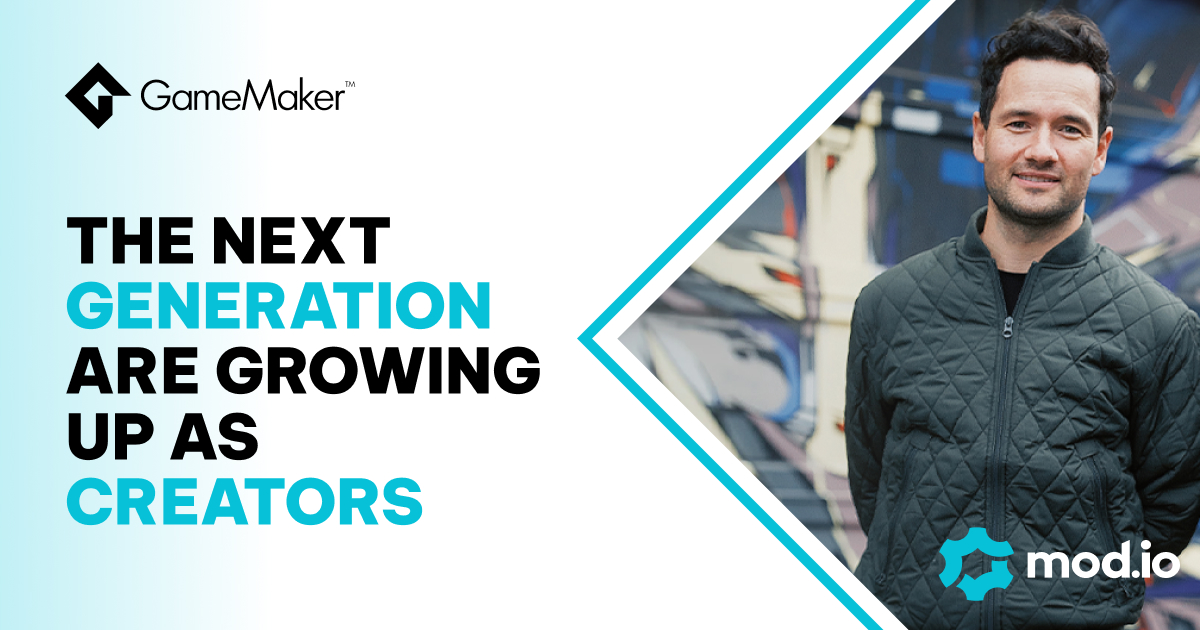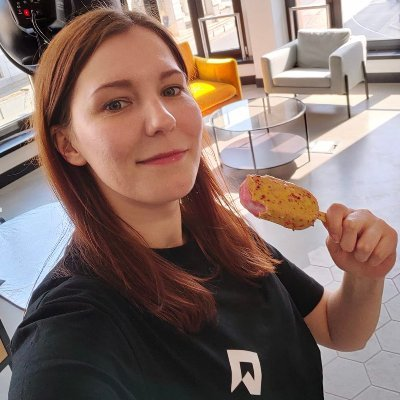Scott Reismanis is the founder of mod.io and ModDB.com, one of the largest and longest serving mod destinations attracting over five million monthly visitors.
We asked Scott how indie developers can leverage modding, the surprise benefits when communities mod your game, and which mods were his personal favourites.
Download the free, open-source mod.io extension for GameMaker from our GitHub page.
What is mod.io?
mod.io is an open source solution that provides an API, plugins/SDK, and platform for developers that enables them to seamlessly integrate user-generated content and mods into their games.
It allows gamers to easily discover, download, and install mods across multiple platforms, including PC, console, and mobile. We’re currently the only UGC middleware platform certified on PlayStation, Xbox, and Nintendo Switch.
Today, mod.io is live in over 150 games on PC, console, VR, and mobile, powering more than 700 million mod downloads to date.
Why did you decide to create mod.io?
I founded mod.io in 2017 because I wanted to take modding to consoles and beyond, to provide a way for studios to grow their mod community, and benefit from happier more engaged players.
My vision is to elevate the impact and importance of mods for games where content and player engagement are vital, and to create thriving creator economies as a new opportunity for studios to explore.
What was the inspiration behind creating mod.io?
The idea was to give game developers an easy-to-use solution for making mods accessible via the in-game menu, on all platforms, with community building tools attached.
We wanted to create a service where game developers and mod creators can connect and collaborate more efficiently, while also allowing gamers to enjoy a more immersive and personalised gaming experience.
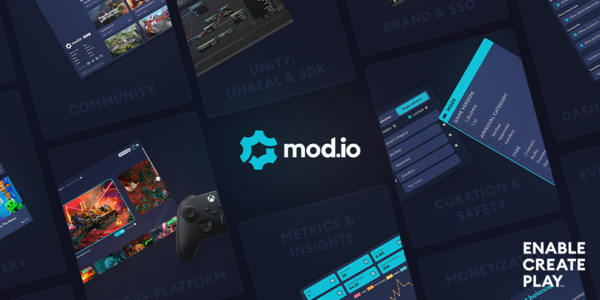
Mods open new possibilities for game development
How can mod.io help an indie game developer?
mod.io can be transformative for developers, because mods are transformative.
Our plugin with GameMaker is the first step towards making it super straightforward to launch a mod community, with a drop-in solution you can start using once you’ve made your game moddable.
We know shipping a great game is complex and takes time, so our aim is to make the mod side easier, offer a better player experience for discovering mods, and help you promote your launch once your creator community is live.
Done well, the end result should provide a diverse stream of new content; all for very little time investment from the studio. Players will create mods, so why not embrace that?
What is the benefit of including mods in games?
For players, implementing mod support in-game can significantly enhance the experience by adding new features, levels, and so much more. Players can customise the game to their liking, creating a unique and personalised experience that can keep them engaged for longer.
For studios and publishers, it’s an avenue to introduce new content without dedicating development time to the creation of that content. It demonstrates that they value their creator community, engagement goes up, and so does player retention. It’s a fantastic value add to any game.
What are the risks of including mods?
User-generated content is creative, but it’s also user-generated, meaning it's always healthy to have a content reporting and moderation process defined (which mod.io provides dashboards for).
With this in place, the risk of mods being broken or inappropriate can be mitigated, provided you keep an eye on the community and take action when required.
We provide a ton of tools, settings, and dashboards to allow game developers to pick how they want their community to function, and the process content must follow to go live. We also have automated systems like automated file scanning, word scanning and a rules engine which we are looking to incorporate AI checks into.
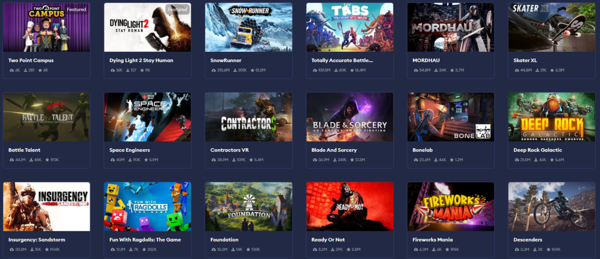
Some of the games integrated with mod.io
What types of mods are most popular?
This really depends on the type of game. In simulation games, it’s generally planes, trains, and vehicles, while in multiplayer games it's a combination of maps and cosmetics.
In GameMaker games, people are likely going to want to expand the universe and gameplay you’ve created, or change the items, bosses, and content in the world.
Best advice we can give is to try and support a dynamic range of mods, and your creators will quickly make the type of content they want to play. Additionally, mod.io provides metrics allowing you to see the trends that can help inform future content decisions - you’ll always know what your community wants.
How can a developer prepare for including mods in their games?
It’s very different for each game - some developers add it after their game is released when they want more content to keep players engaged, while others plan for mod support early and design their gameplay systems and content to be moddable.
A high level approach would probably look something like this:
- Design for modding - when possible, of course. From the early stages of development, keep modding in mind.
- Create example mods or documentation creators can learn from.
- Build modding tools if you can, though most games don’t and let their creators learn from the examples and documentation.
- Implement mod.io, set up your online mod hub.
- Invite players and creators in your community to get involved and start submitting content.
- Go live!
Is custom content in games the future of gaming?
It’s definitely going to be a large part of it. It already is.
If you look at Roblox, what Fortnite is doing with UEFN, and what we’re doing to bring fully cross-platform mods to everyone, the space is absolutely thriving right now. And I think that growth will be exponential.
The next generation are growing up as creators. Kids are creating for Roblox before their age hits double digits, and it’s just the norm for them. I think as this generation matures we’re going to see more and more games focused around UGC because the creators are just going to be everywhere.
What are the mods you like the most?
I’m old school. I came up with mods like Natural Selection for Half-Life (whose developers went on to create Subnautica), and Red Orchestra for Unreal Tournament 2004 and played the hell out of both.
Mods that created entire genres, like Counter-Strike, DotA, DayZ, and PUBG, still amaze me. For a passion project to explode into something that shifts the entire industry really just showcases the power of mods & UGC.
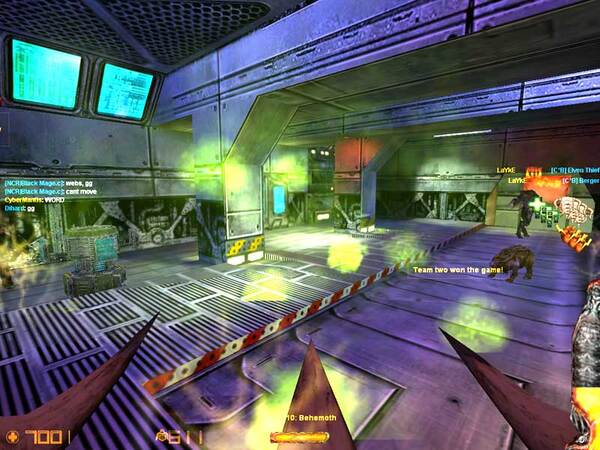
Natural Selection for Half-Life, a mod made by Charlie "Flayra" Cleveland
Is there a type of mod for your favourite game you’d like to see?
I want to see mods interwoven into the gameplay experience, and for games to experiment and try interesting things.
Imagine in Super Mario if every time you went down a green pipe, it teleported you into a player created level. Or when your game ends, player created levels keep running.
Don’t just let players change the weapon, monster, or player skins, but also define their attributes. I think we’ve barely scratched the surface of what’s possible, and would love to see more dynamic modding systems emerge.

